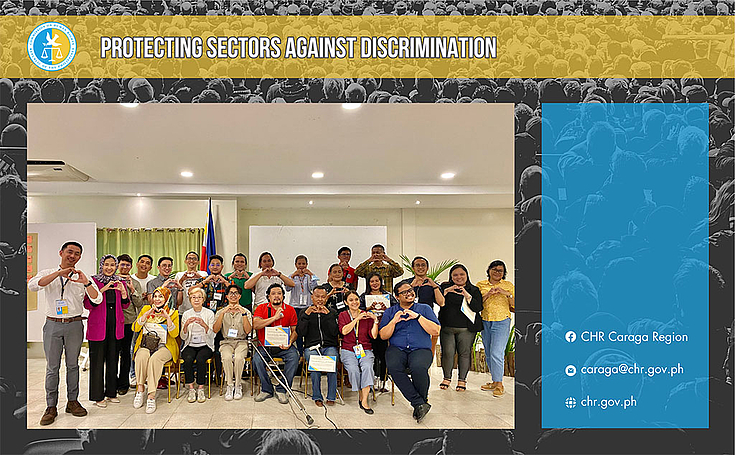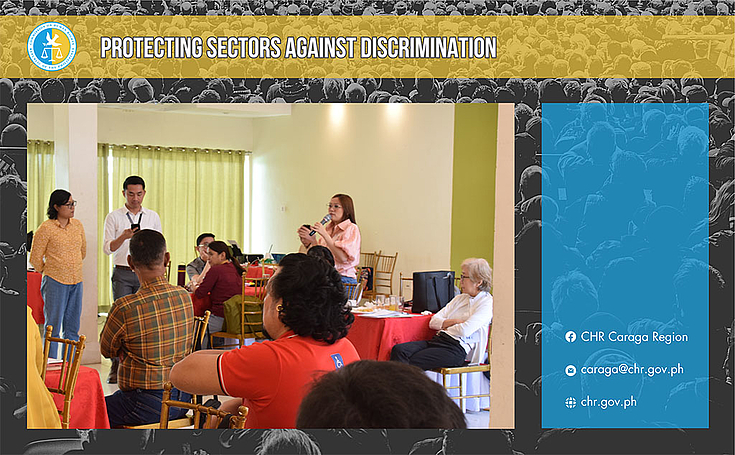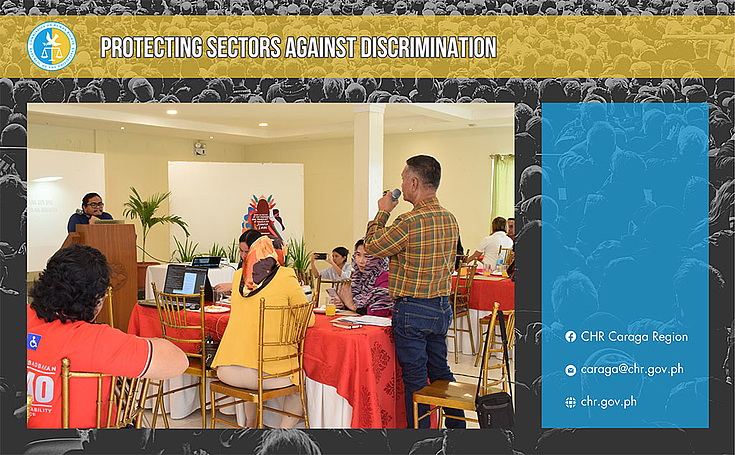Community-based Dialogues Project (CBD)
CBD with Affected Sectors on the Regional Model Ordinance Drafted by CHR-Caraga Protecting Sectors against Discrimination
CHR
The activity was attended by about 40 participants representing groups from LGBTQIA (lesbian, gay, bisexual, transgender, queer, intersex, asexual), women and children, elderly, persons with disability (PWD), indigenous peoples (IP), persons with HIV, government agencies (National Commission of Muslim Filipinos, Department of Education), among others as well as officers and staff from CHR Caraga led by its Regional Director, Atty. Aurora Cembrano-Ramos, CHR central office (Policy Advisory Office) and HSF representative.
In her welcome message, Atty. Cembrano-Ramos expressed her utmost gratitude and appreciation to the participants and HSF representative for attending the activity. She noted that the issue of discussion affects vulnerable and disadvantaged sectors which are often ignored or sidetracked in society and therefore CHR Caraga provided a venue to surface their issues, share their stories and experiences, and offer recommendations in crafting policies especially towards the passage of an anti-discrimination law at the national level and local ordinance at the LGU level. She thanked the HSF for its commitment to support CHR Caraga, the policy unit of the CHR central office and her colleagues in the regional office for the conduct of the activity.
CHR
Atty. Gerlyn Gamolo, OIC of CHR Caraga Legal Division conveyed the rationale of the dialogue which is to push for the passage of the Comprehensive Anti-Discrimination Bill pending in Congress since 2020. She noted that various sectors experience discrimination, thus, the importance of localizing a comprehensive ordinance. She assured the participants that their inputs will help enrich the draft ordinance. CHR Caraga intends to launch the final regional model ordinance on June 30, 2023 and distribute the same to LGUs all over the region and work on lobbying for its local passage.
Atty. Euvic Ferrer, OIC of Policy Program mentioned that the working draft is based on the CHR mother document and from existing laws and policies related thereto, adding that the final ordinance will be able to capture the sectors’ experiences based on the context of the region. He said this forms part of the pocket of local model ordinances being crafted by CHR Caraga. He shared that only 45 LGUs have anti-discrimination ordinances with more than half without implementing rules and regulations (IRR) (7 out of 81 provinces, 30 out of 146 cities and 8 out of 1488 municipalities).
He underscored the following points in the discussion, viz: (i) Discrimination on the Basis of Protected Attributes; and (ii) Acts of Discrimination. With respect to (i), the protected attributes are directly or indirectly based on the actual or perceived ethnicity, race, color, sex, gender, sexual orientation, gender identity, gender expression, sex characteristics, language, religious expression or belief, political or other opinion, national or social origin, property, birth and other status, and other protected attributes. As to (ii), there is discrimination when a person is arbitrarily deprived of the opportunity to enjoy, exercise and/or fulfill rights, privileges, duties, responsibilities a person lawfully may be entitled to on the basis of attributes they possess and deemed protected under the ordinance. He mentioned some circumstances where discrimination may be committed such as political participation; right to organization; denial of right to employment; right to education and training; right to access to goods and services; right to reasonable accommodation; Denial of the Right to Access Places, Facilities and Modes of Transportation for Public Use and to Attend Meetings Open to the Public; Right against Wrongful Portrayal; Right to Access LGU Services, Request for Clearances, Certifications; Freedom From Hateful Speech, Vilification, and Similar Acts; Right to Health and Well-being; Right Against Profiling; Right Against Illegal Detention and Confinement; Discrimination through Analogous Acts that Result in Impairment of the Enjoyment of Human Rights and Fundamental Freedoms; Duty of the Private Sector; Duty of the Local Government; and Duty of the CHR, among others. He also shared some examples in clarifying some of the provisions in the ordinance.
CHR
During the Open Forum, additional information, comments and suggestions were raised: (i) the ordinance includes components of promotion/advocacy, affirmative actions, and prevention, as well as creation of responsibility centers; (ii) prioritize localization of ordinance in areas with no ordinance yet, and those with ordinance but need some amendments; (iii) engage/coordinate with LGU, concerned government agencies and support organizations for funding/resources/resolution of issues; (iv) some LGUs do not provide benefits to partisan organizations (e.g. LGBT); (v) be active in political and decision-making processes toward crafting relevant policies and programs; (vi) launch enhanced version of ordinance on June 30, 2023 during Pride Parade; (vii) issues on religious expression and LGBT access to schools were not considered; (viii) CHR Caraga will lobby for support from local organizations during inter-agency committee hearings for adoption of ordinance; (ix) ensure accessible and culturally-sensitive birthing facilities for IPs; (x) foster respect, accessibility and inclusivity for seniors, PWDs, and the youth; (xi) lack of family support; and (xii) CHR Caraga will consider inputs in improving the coverage of the ordinance, among others.
Three (3) breakout sessions representing different sectors were facilitated by CHR Caraga lawyers. The participants discussed four (4) questions, as follows: (i) Does the model ordinance adequately protect vulnerable sectors?, (ii) Are there vulnerable sectors that have not yet been considered?, (iii) What are experiences of discrimination and exclusion of the sectors that have not been adequately documented and therefore not reflected in the prohibited acts of discrimination in the model ordinance?, and (iv) Are the mechanisms for protection against discrimination enough?
Thereafter, the workshop outputs were presented in plenary and the presentors entertained questions and clarifications. It was a good opportunity to hold the dialogue with the affected sectors to be able to share first-hand their experiences and give their comments/suggestions prior to launch of the regional model ordinance.
Finally, Certificates of Appreciation were handed out to the sectoral groups/organizations present for their invaluable contributions to the activity. A group photo capped the activity.



